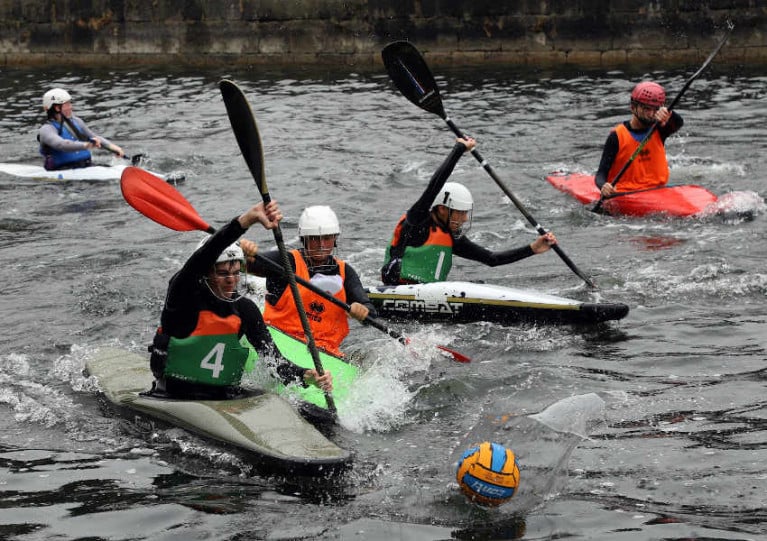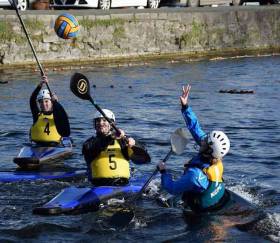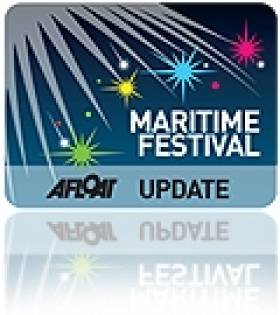Displaying items by tag: canoe polo
Royal Canal: Navigation Restrictions for Kilcock Harbour Canoe Polo Event
Waterways Ireland wishes to advises all masters of vessels on and users of the Royal Canal that a canoe polo event will be taking place in Kilcock Harbour this Saturday 16 and Sunday 17 September.
In order to facilitate the event, navigation in this area will be very restricted from 3pm on Friday 15 September to 7pm on Sunday 17 September.
Vessels should move away from any of the moorings in the harbour area for the duration of the event, and will only be able to navigate past the event if allowed to proceed by the event organisers between event activities through a prior arrangement.
Masters of vessels are therefore requested to proceed with additional caution in the vicinity of the event and to obey any instructions given by event stewards, the cross-border body for Ireland’s inland waterways adds.
This story was updated on Friday 15 September to reflect the updated dates of the canoe polo event.
Waterways Ireland wishes to advises all masters of vessels on and users of the Royal Canal that a canoe polo event will be taking place in Kilcock Harbour this Sunday 18 June.
In order to facilitate the event, navigation in this area will be very restricted from 3pm on Saturday 17 June to 7pm on Sunday 18 June.
Vessels should move away from any of the moorings in the harbour area for the duration of the event, and will only be able to navigate past the event if allowed to proceed by the event organisers between event activities through a prior arrangement.
Masters of vessels are therefore requested to proceed with additional caution in the vicinity of the event and to obey any instructions given by event stewards, the cross-border body for Ireland’s inland waterways adds.
Waterways Ireland advises masters of vessels and waterways users on the Royal Canal that the following canoe polo events will take place in Mullingar Harbour during the summer months of 2023:
- Junior Canoe Polo Competition - Sunday 21 May
- National Club Championships – 8-9 July
- Overload Canoe Polo Camp – 25-27 August
Masters of vessels are requested to moor outside the harbour area on these dates in order to facilitate the canoe polo events, the cross-border body for Ireland’s inland waterways adds.
Waterways Ireland advises masters and owners of vessels on the Royal Canal that the Canoe Polo Club Championship will be taking place in Mullingar Harbour this weekend, Saturday 9 and Sunday 10 July between 8am and 5pm each day.
Masters of craft are requested to proceed at slow speed and with minimum wash and note any directions issued by the stewards. The harbour should also be kept clear of moored vessels during this time, adds the cross-border body for Ireland’s inland waterways.
Waterways Ireland advises masters of vessels and users of the Royal Canal of another canoe polo event in Mullingar Harbour this Saturday 18 June.
The event will take place from 7am to 6.30pm and the harbour should be kept clear of any moored vessels during this time.
Masters of craft are requested to proceed at slow speed and with minimum wash and note any directions issued by the stewards, adds the cross-border body for Ireland’s inland waterways.
Waterways Ireland advises masters and owners of vessels on the Royal Canal that a further canoe polo event will be taking place in Mullingar Harbour this weekend, Saturday 14 and Sunday 15 May.
A subsequent event will be held on the weekend of Saturday 4 and Sunday 5 June, with competition scheduled between 10am and 4pm each day.
Masters of craft are requested to proceed at slow speed and with minimum wash and note any directions issued by the stewards. The harbour should be kept clear of moored vessels during this time, adds the cross-border body for Ireland’s inland waterways.
Royal Canal: Canoe Polo Event in Mullingar Harbour
Waterways Ireland advises masters of vessels and users of the Royal Canal that a canoe polo event will be taking place in Mullingar Harbour on Sunday 8 May from 9am to 5pm.
Masters of craft are requested to proceed at slow speed and with minimum wash and note any directions issued by the stewards. The harbour should be kept clear of moored vessels during this time.
Boat Restrictions For Canoe Polo Events On Royal Canal In Mullingar
Waterways Ireland advises all masters and users of the Royal Canal that canoe polo events will take place in the vicinity of the harbour in Mullingar this weekend, 27-28 September and the following Sunday, 4 October.
Boat movements in the area will be restricted on the inland waterway for the duration of the events. Masters of vessels should navigate the area with caution and comply with guidance from marshals.
Further information may be obtained from Mullingar Harbour Canoe Polo at 086 244 62 20.
Kilcock Hosts National Canoe Polo Junior Competition
#Canoeing: Kilcock Canoe Polo Club is hosting the National Junior Competition in the newly re-opened Kilcock Harbour on Sunday, May 14th.
This event will see 120 players aged between 10 and 19 compete, with teams coming from around the country, North and South, together to play this exciting team sport.
Canoe Polo is like Water Polo, but with the added excitement of the players being in boats. Players pass the ball between a team of five players and shoot at the opponents goal suspended over the water. The club operates from the Harbour making this an exciting spectacle for the town.
Kilcock has a history of Canoe Polo, with the club starting in 1998. The club caters for all ages from six to over 60 and has complete beginners looking to have fun and develop some skills, as well as more serious athletes - Kilcock players frequently represent Ireland on National teams and the club is running beginner courses every Wednesday evening.
Kildare County Council have supported and worked with the Kilcock Canoe Polo Club on the re-opening of the Harbour for amenity use, and are kindly sponsoring this competition in association with the Local Authority Waters and Communities Office.
Galway Expects Crowds For First Sea Festival
#Festivals - "Tens of thousands" of visitors are expected to flock to the City of the Tribes later this month for the first Galway Sea Festival over the June bank holiday weekend, according to the Galway Advertiser.
Dubbed the 'Mini-Volvo' by locals, the four-day event from 31 May till 3 June is hoped to recreate the celebratory atmosphere of last summer's successful Volvo Ocean Race finale, with a wide range of events both on and off the waters of Galway Bay.
Highlights include the festival regatta led by the Galway Bay Sailing Club's parades of sail on the Friday and Saturday evenings, and a traditional boat regatta by Badoiri na Cladaigh.
Watersports enthusiasts can get a taste of canoeing, diving, sea kayaking and windsurfing over the weekend, which also coincides with World Oceans Day - with family-friendly activities at the Galway Atlantaquaria on Sunday 2 June - and the International Canoe Polo Championships at Claddagh Basin.
Preceding the festival on Thursday 30 May will be the Bright Blue Sea Conference, a major international symposium on marine science, renewable energy, the environment and the 'blue economy'.
Last month it was reported that the Galway Sea Festival received the financial backing of Galway City Council, spurred by its aims to promote Galway as a maritime destination or commerce and tourism.
The Galway Advertiser has much more on the festival HERE.
































































